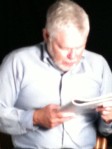Benford’s Flies
A few weeks ago I met science fiction author Gregory Benford. My friends Jason Sussberg and David Alvarado were shooting for their documentary about radical life extension, so I tagged along and went with them to Irvine for the interview with Benford regarding the work of his company Genescient. My copy of In the Ocean of Night tucked into my jacket pocket, I relished the opportunity to chew the fat with a major juggernaut of the sci-fi world.
Benford’s biotechnology company, Genescient, researches and develops a new field of science known as Genomics 2.0. More specifically they’ve been testing proprietary gene sequencing on a strain of Drosophila fruit flies, known as the “Methuselah flies.” Three decades of selective breeding has created reproductive longevity and optimal health in these buggers. Benford sees a way to parlay the knowledge gleaned from the fly experiments to fashion lines of pharmacogenomics that may greatly increase the human lifespan. Ultimately Benford envisions a future of advanced gene therapy that allows humans to regularly live to over 150 years-old.
He’s hardly the only one who believes in life extension. A vast panoply of futurists now maintain it is more than possible that 21st century humans will use the overlapping bridges of biotechnology, nanotechnology, and mind uploading to not only reverse the effects of aging but to evolve to new, machine-based, substrates of consciousness entirely. Once buoyed by artificial intelligence, these efforts will reach the point at which technology is progressing so exponentially the future will be unpredictable and incomprehensible. This is known as the Singularity.
My friends’ documentary, The Methuselah Generation, will delve headlong into these theories, primarily investigating biotechnological methods to life extension. Other futurists, like economist Robin Hanson and the world renown Aubrey de Grey of the SENS Foundation, will present rousing thought experiments pertaining to the future of human life. The documentary, which the filmmakers are shooting in both 3D and 2D codecs, will also explore the social, economic, judicial, and emotional impacts of extended lifespans. For example, does a person convicted of a life sentence get to live forever in prison, eternally sapping taxpayer dollars? Will poor people be able to come along for the ride, or will the future be a rich-and-privileged only society? Say your friends and family can’t afford the life extension therapies. How appealing is a future in which everyone you know is dead?
Gregory Benford’s interview took place at his home in Irvine. Though I made a conscious effort not to be nosey I couldn’t help but notice that beside his 1975 Nebula Award (one of the two he claimed) lay a Big Bang Theory DVD nestled in it’s Netflix sleeve. I was currently writing a spec script for the show and thought about querying Benford about what he thought about the pop nerd sci sitcom. Instead I asked him about the original Chesley Bonestell paintings bedecking his office.

They sell well now, he said. “Death is good for art sales.”
“I guess life extension is bad for art,” Jason quipped.
During his interview, Benford touched upon the Methuselah flies, biotechnology, intersections between science and science fiction, the death of his first wife, which motivated him to create Genescient in the first place, and the Singularity. With the “Rapture of the nerds” becoming so conversationally popular these days–what with Ray Kurzweil’s Transcendent Man release, Patton Oswalt’s #Etewaf meme in Wired, and Time Magazine’s recent state-of-the-singularity piece–it was simply too tempting not to ask the man who first created the computer virus what he thought the Singularity would be like. The answer, which I’ll remember until the day I die (or, in the event I don’t die, for several hundred years), was rather simple:

A day after the Singularity you won’t be able to read the newspaper.
If that’s the case, the human economy itself will be up for grabs. Who knows how capital will be generated in an age of immortality and abundance? But Genescient will always have its flies. And if the whole biotechnology thing doesn’t work out they can always sell a new line of the fake ice cubes with dead flies in their centers.
After all, we’ll still need practical jokes after the Singularity.
–Jake Anderson

 Global Consciousness Project
Global Consciousness Project
Jake’s exposition of the Benford experience is quite thought provoking even for a sci fi anti-junky. I especially liked his questioning of the sociological implications, the possible fairness with which life extension would be delivered. Finally, though, I have to wonder if the life extension motif holds a special appeal to the Facebook generation, who already see eternity not in a “grain of sand,” but in computer chip or two.
All part of living forever in cyberspace!
BTW, Jason’s quip that possibly, “life extension is bad for art” should be savored and saved as a short story or article title.